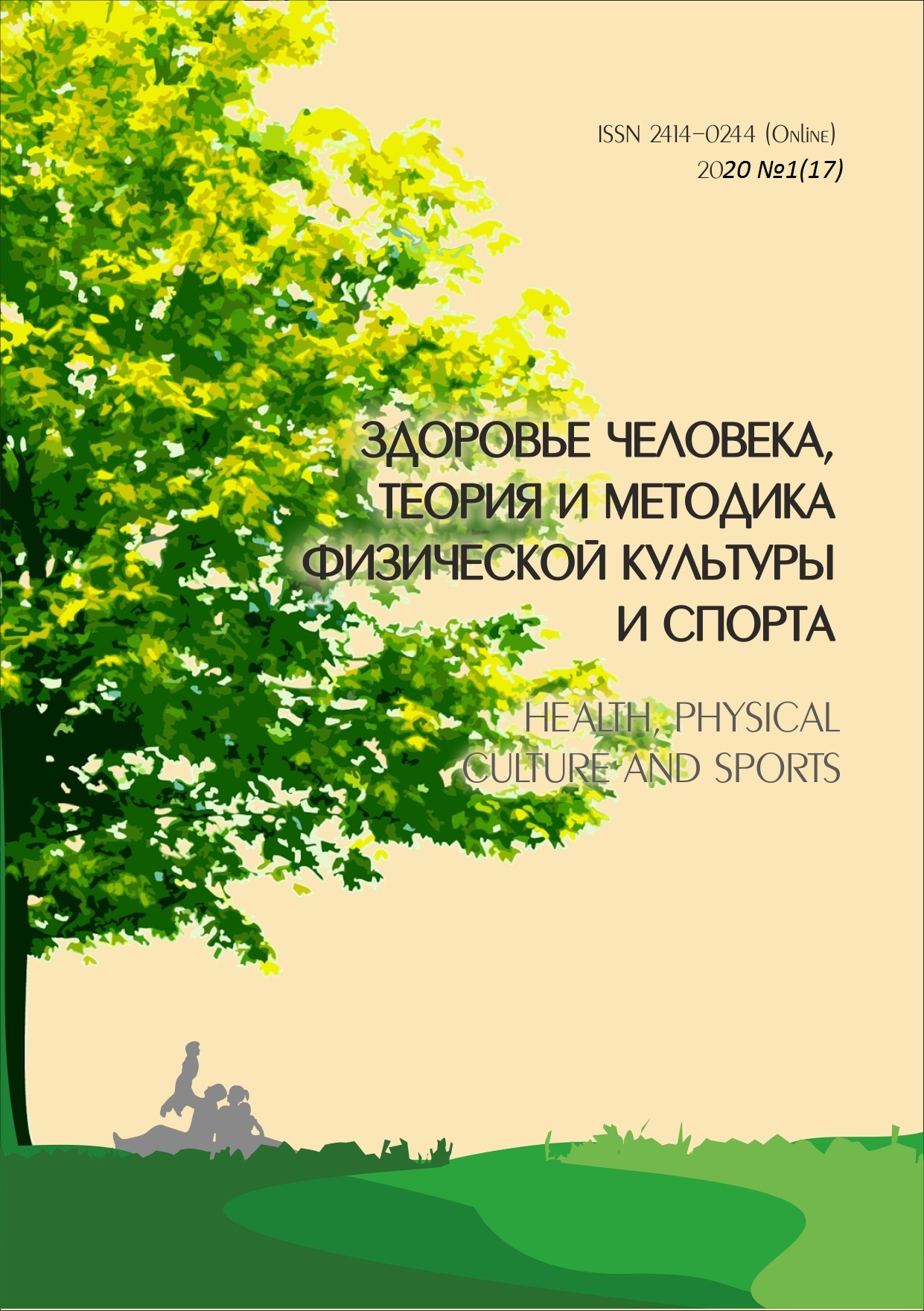THE EFFECT OF MEMORY INTERFERENCE ON THE FORMATION OF MOTOR SKILL
Abstract
The article is devoted to the features of the formation of long-term memory and their impact on the training process. The purpose of the study is to determine the effect of interference on the formation of motor skills and to find ways to eliminate its negative impact.
Two processes are associated with memory – remembering and forgetting, the necessary information must be remembered, the unnecessary – forgotten. There are a number of factors that contribute to or hamper the process of memorization. One of the factors contributing to forgetting is interference, in translation from Latin interferentis is mutually damaging. Interference is a phenomenon in which a deterioration of stored information occurs under the influence of other information. The phenomenon of interference was repeatedly scientifically confirmed, but has not yet found proper practical application in pedagogy. The meaning of this phenomenon is as follows. If an individual receives two blocks of information in a row and there is no pause between them or it is very short – this leads to forgetting both the first and second blocks (retroactive and proactive interference).
In the 21st century, the phenomenon of memory interference found its scientific explanation. It turned out that when performing any action (regardless of whether this action is known or studied), the information enters into short-term memory, and after completion of execution, consolidation takes place – the process of “rewriting” into long-term. Like any other work, this process requires time and energy, and if they are lacking, the information will not be consolidated, in other words, memorized.
In order to reduce the influence of interference on the process of consolidation of motor action, it is proposed: 1) when studying a complexly coordinated motor action, at the stage of learning, it is necessary to finish the exercise when receiving a positive result “Stop on victory”, not to make a mistake; 2) when studying several technical actions one after another, during rest, give a pause during which the student does not receive and does not betray any information.
Downloads
References
Чернышов, М. Ю., Каверзина, А. В., Журавлёва, А. М., & Чернышова, Г. Ю. (2013). О механизмах ассоциативной памяти и психологическом приеме информационного насыщения поля памяти в дискурсе как средстве вспоминания забытого. Вестник Российского университета дружбы народов. Серия: Информатизация образования, (4), 67-78.
Нуркова Вероника Валерьевна, & Гофман Алёна Алексеевна (2016). Забывание: проблема наличия следа памяти, его доступности и намеренного контроля. Национальный психологический журнал, 3 (23), 64-71.
Ershova Regina V., & Tarnow Eugen (2018). Interference in working memory is not displacement nor competition - it is limited destruction. Вестник Российского университета дружбы народов. Серия: Психология и педагогика, 15 (4), 488-499.
Александрова Ю.И. Психофизиология.. СПб., 2004. 496 с.
Кандаков И.М. Психология : иллюстрированный словарь. СПб., 2003. 512 с.
Корпулина В.Н., Смирнова М.Н., Гордеева Н.О. Психологический словарь. 3-е изд., доп. и перераб. Ростов н/Д., 2004. 640 с.
Созинов А.В. Об ассоциативной теории, механизмах запоминания и переключения между задачами : видеолекция. URL: https://postnauka.ru/video/48962 (дата обращения: 05.01.2020).
Анохин К.В. Мозг и разум : видеолекция. Ч. 1. URL:https://tvkultura.ru/video/show/brand_id/20898/episode_id/156199/ (дата обращения: 05.01.2020).
Анохин К.В. Мозг и разум : видеолекция. Ч. 2. URL:https://tvkultura.ru/video/show/brand_id/20898/episode_id/156648/ (дата обращения 05.01.2020).
References
Chernyshov, M. Yu., Kaverzina, A. V., Zhuravleva, A. M., & Chernyshova, G. Yu. (2013). O mekhanizmakh assotsiativnoi pamyati i psikhologicheskom prieme informatsionnogo nasyshcheniya polya pamyati v diskurse kak sredstve vspominaniya zabytogo. Vestnik Rossiiskogo universiteta druzhby narodov. Seriya: Informatizatsiya obrazovaniya, (4), 67-78.
Nurkova Veronika Valer'evna, & Gofman Alena Alekseevna (2016). Zabyvanie: problema nalichiya sleda pamyati, ego dostupnosti i namerennogo kontrolya. Natsional'nyi psikhologicheskii zhurnal, 3 (23), 64-71.
Ershova Regina V., & Tarnow Eugen (2018). Interference in working memory is not displacement nor competition - it is limited destruction. Vestnik Rossiiskogo universiteta druzhby narodov. Seriya: Psikhologiya i pedagogika, 15 (4), 488-499.
Chernyshov, M. Yu., Kaverzina, A. V., Zhuravleva, A. M., & Chernyshova, G. Yu. (2013). O mekhanizmakh assotsiativnoi pamyati i psikhologicheskom prieme informatsionnogo nasyshcheniya polya pamyati v diskurse kak sredstve vspominaniya zabytogo. Vestnik Rossiiskogo universiteta druzhby narodov. Seriya: Informatizatsiya obrazovaniya, (4), 67-78.
Nurkova Veronika Valer'evna, & Gofman Alena Alekseevna (2016). Zabyvanie: problema nalichiya sleda pamyati, ego dostupnosti i namerennogo kontrolya. Natsional'nyi psikhologicheskii zhurnal, (3 (23)), 64-71.
Ershova Regina V., & Tarnow Eugen (2018). Interference in working memory is not displacement nor competition - it is limited destruction. Vestnik Rossiiskogo universiteta druzhby narodov. Seriya: Psikhologiya i pedagogika, 15 (4), 488-499.
Aleksandrova Yu.I. Psihofiziologiya. SPb., 2004. 496 (in Russuan).
Kandakov I.M. Psihologiya : illyustrirovannyj slovar'. SPb., 2003. 512 s. (in Russuan).
Korpulina V.N., Smirnova M.N., Gordeeva N.O. Psihologicheskij slovar'. 3-e izd., dop. i pererab. Rostov n/D., 2004. 640. (in Russuan).
Sozinov A.V. Ob associativnoj teorii, mekhanizmah zapominaniya i pereklyucheniya mezhdu zadachami : videolekciya. URL: https://postnauka.ru/video/48962 (Accessed on: 05.01.2020) (in Russuan).
Anohin K.V. Mozg i razum : videolekciya. Ch. 1. URL: https://tvkultura.ru/video/show/brand_id/20898/episode_id/156199/ (Accessed on: 05.01.2020) (in Russuan).
Anohin K.V. Mozg i razum : videolekciya. Ch. 2. URL: https://tvkultura.ru/video/show/brand_id/20898/episode_id/156648/ (Accessed on: 05.01.2020) (in Russuan).

This work is licensed under a Creative Commons Attribution-NonCommercial 4.0 International License.
An author should not normally publish manuscripts describing essentially the same research in multiple journals or publication venues. Such redundant publication is generally considered to constitute unethical publishing behavior, and if discovered may result in a manuscript under consideration being rejected, or a published article being retracted.
Authors of manuscripts reporting on original research should present an accurate account of the work performed, accompanied by an objective discussion of its significance. Underlying data should be represented accurately in the manuscript. The manuscript should contain sufficient detail and references to permit others to replicate the work. The fabrication of results and the making of fraudulent or knowingly inaccurate statements constitute unethical behavior and may be cause for rejection or retraction of a manuscript or published article.





